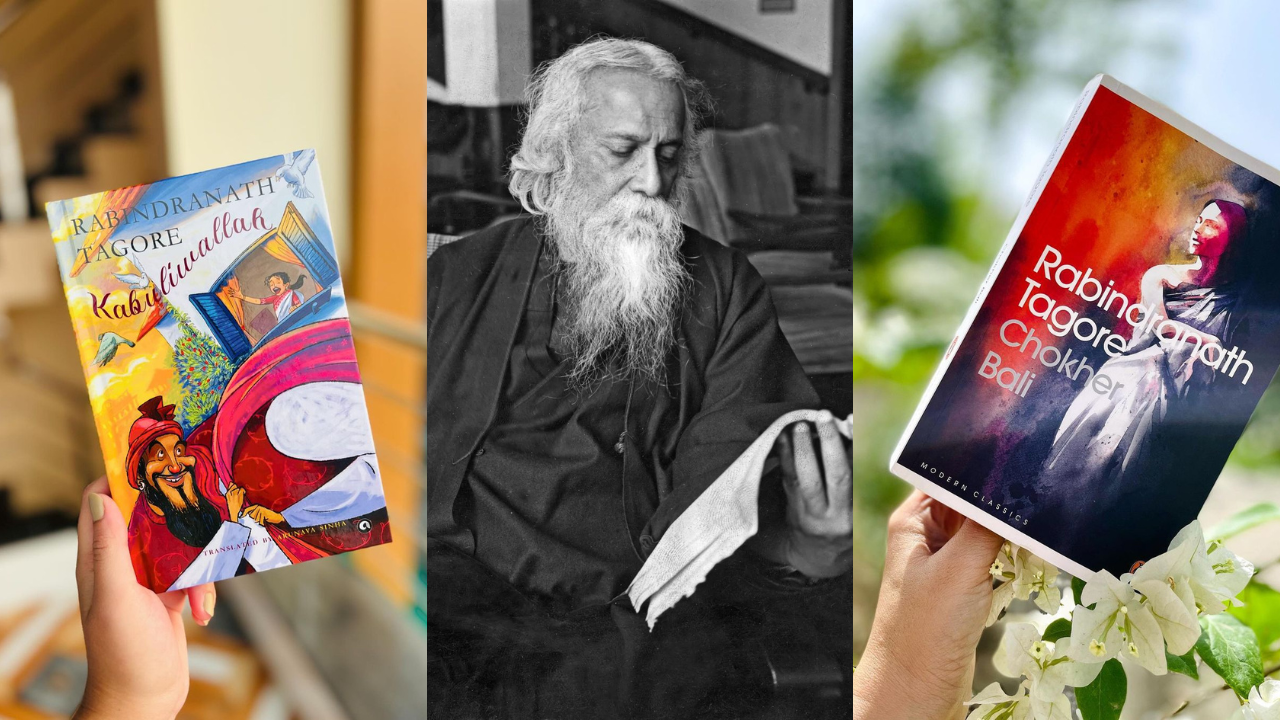
Rabindranath Tagore Jayanti 2024: 10 Essential Books by Rabindranath Tagore, India’s Sole Nobel Laureate in Literature (Picture Credit – Instagram)
Rabindranath Tagore, a polymath and a prolific writer, holds the distinction of being the first non-European to win the Nobel Prize in Literature in 1913. His works include poetry, novels, plays, and essays that delve deeply into themes such as identity, spirituality, and nationalism. On the occasion of Rabindranath Tagore Jayanti in 2024, it is fitting to explore ten of his most essential books that not only showcase his literary genius but also continue to inspire and influence generations globally.
1. Gitanjali (Song Offerings)
‘Gitanjali’ is not just Tagore’s most acclaimed work, but also a transformative collection that brought him the Nobel Prize. These poems delve into the spiritual and the profound, intertwining divine and human elements of love with universal appeal. The lyrical quality and flowing prose of these poems beautifully encapsulate the depth of Tagore’s spiritual insights, making the reader ponder life’s great mysteries and joys.
2. Gora
Set during the Bengal Renaissance, ‘Gora’ is a rich narrative filled with complex characters and intricate plot lines, reflecting the societal upheavals of the time. The protagonist, Gora, is a fervent Hindu who finds himself constantly challenging and being challenged by the evolving ideologies around him. The novel is a deep exploration of self-identity amidst the push and pull of cultural and religious dogmas, portraying the personal growth of characters and the socio-political dynamics of colonial India.
3. Chokher Bali (A Grain of Sand)
In ‘Chokher Bali,’ Tagore brilliantly portrays the emotional and psychological depth of a young widow, Binodini, against the restrictive societal norms of the late 19th century. This novel intricately explores themes of love, betrayal, and redemption, weaving a complex web of relationships and moral dilemmas. Binodini’s character emerges as both a victim and a critique of societal expectations, making the narrative a poignant study of forbidden emotions and societal hypocrisy.
4. The Home and the World
This novel addresses the tension between tradition and modernity reflected in the Swadeshi movement, part of India’s struggle for independence from British rule. Through the lives of its three main characters, Tagore explores the personal dilemmas and ideological battles that accompany political activism and moral awakening. “The Home and the World” is a delicate portrayal of the conflicts between personal loyalty and national duty, and the painful choices that often accompany the path towards a modern India.
5. The Post Office (Dak Ghar)
‘The Post Office’ is a tender play that touches on themes of hope, freedom, and the human spirit through the eyes of Amal, a terminally ill boy. Confined by his illness, Amal dreams of the outside world, engaging with passersby and awaiting letters from the king. The play is symbolic of the freedom of the spirit in the face of physical limitations and is celebrated for its universal appeal and profound simplicity.
5. Stray Birds
‘Stray Birds’ is a collection of philosophical musings and poetic aphorisms that capture the essence of human life and the natural world. Tagore’s thoughts are presented in a precise yet lyrical style, each one reflecting a unique observation or a profound insight, ranging from the complexities of love to the simplicities of daily life.
6. Red Oleanders (Raktakarabi)
In the allegorical play ‘Red Oleanders,’ Tagore crafts a narrative set in a town dominated by greed and oppression. Nandini, the protagonist, represents resistance and hope against the tyrannical power of wealth and industrial exploitation. Her journey and interactions reveal the destructive impact of greed on human values and the environment, making a strong case for integrity and freedom.
7. Sadhana: The Realisation of Life
‘Sadhana’ offers a deep dive into the spiritual philosophies that underscore Tagore’s literary and personal beliefs. These essays reflect on the ways spiritual enlightenment can be achieved through personal reflection, societal interaction, and a harmonious connection with the universe, providing a roadmap to personal fulfilment and spiritual peace.
9. The King of the Dark Chamber
This play is an exploration of truth and enlightenment, both personal and communal. The mysterious king, who never shows his face, symbolizes the ultimate truth that is sought by all yet fully understood by none. The narrative unfolds as a spiritual quest for understanding and truth, filled with symbolic and mystical elements that challenge the characters’ perceptions of reality and illusion.
10. Kabuliwala
‘Kabuliwala’ is a touching short story that vividly captures the bond between a Pashtun merchant from Afghanistan, who sells dry fruits for a living, and a young girl named Mini in Kolkata, India. The narrative delves into themes of friendship, nostalgia, and the universality of paternal love. Tagore’s storytelling brilliantly portrays how deep connections can transcend cultural and geographical barriers, highlighting the human emotions and bonds that underpin seemingly everyday interactions. The story also reflects on the pains of separation and the poignant reunion between Kabuliwala and Mini, illustrating the lasting impact of genuine affection and understanding.
Each of these works by Rabindranath Tagore not only enriches Indian literature but also contributes significantly to global literature, offering insights that are timeless and universally relevant. Celebrating his Jayanti by revisiting these texts is a homage to his enduring legacy as a thinker, educator, philosopher, and literary giant.
